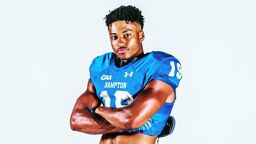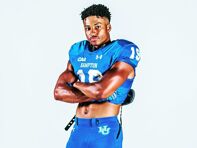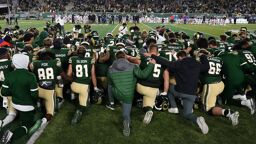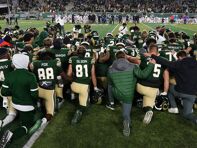For the entirety of my adolescence and college career, I thought being “perfect” was the path to a successful and happy life. Anything else would pronounce failure. And my one fear in life was failure. I wanted to be perfect.
But what is perfection? At 13 I thought I had a pretty good idea.
I was wrong.
The dictionary defines it as someone or something without a mark or flaw. But what we don’t realize at an early age is that we let others – our society and environment – define perfection for us. But who are they to say what is perfect?
This is what I had been told:
Athletically, it was a football player. Scholastically, perfection was a 4.0. Socially, it was to have as many friends as possible. Romantically, it was to date the most beautiful woman possible.
For the more recent years of my life, I was living out the first step of my dream of playing in the NFL, as I played SEC football. Yet those years at Kentucky were also being spent stuck in my own, isolate world because I knew I wasn’t being fully authentic.
Those years at Kentucky were also being spent stuck in my own, isolate world.
I knew I loved football, and I knew I loved sports. But something seemed off. From the outside I had everything going for me, and I was constantly told so. And I still felt this constant internal feeling of shame.
I want to remove that filter for my “perfect” life. I don’t want to let there be any question of who I am. I don’t want to question who I am anymore.
I am a hard-worker. I love football. I love soccer. I love business. I love reading. I enjoy photography. I love Ted Talks. I love people. I am approachable. I am caring. I am kind. I am a loyal friend. I am altruistic. I am creative. I am a life-long learner. I am a writer. I am a four-year Kentucky football letterman. I am an only child. I am a white, 6-foot-2 man. I am gay.
I used to be extremely insecure about some of these. In recent years I have found the strength to be proud of who I am. I am Landon Sobel Foster.
There should be no emphasis on any of my own personal identifiers. Yet I presume one of those statements stood out more than the rest. And that is unfortunate, because my life has been, continues to be, and will be defined by much more than three short words.
I am who I am, and I am who I have been. Now the steel curtain around my heart has been lifted so I can begin living, so I can be.
This isn’t something I chose, but it’s something that I am. For much of my life, all I can remember are my feelings of self-hatred and my longing to be straight. I wanted to fit in, and I did everything I could to ‘make’ myself straight.
One thing I have come to realize is I cannot thrive personally, athletically or professionally if I am not first proud of myself.
It took me 24 years to come to grips with my sexuality. Now I am proud of it. I have to be proud of it. It’s how I was created. It doesn’t change anything. It doesn’t change my compassion for others. It doesn’t change my work ethic. It doesn’t change my values.
I have debated for years whether or not to write something like this, whether to come out publicly. But I know the struggles I have gone through personally, and I know the only way I was able to cope with my own struggles was by reading and hearing similar testimonies of people whom I have come to respect: Ellen DeGeneres, Robbie Rogers, Gus Kenworthy, Jason Collins, Michael Sam, Adam Rippon, Tom Daley and Tyler Oakley, among many others.
Yet even as I heard their stories trickling through the media, they still weren’t enough to give me the courage to take on the locker room of big-time football and its respective culture, a culture I felt is still unwelcoming to gay players. Living in the closet in front of 80,000 fans each and every Saturday manifested itself into a constant state of anxiety, perceiving every interaction as a constant test of being outed and potentially causing a distraction to my team and my university.
There’s a Latin phrase I learned in high school that has always stuck out to me: Esse Quam Videri – “To be, rather than to seem.”
Of all of my lessons in high school, this one reigns supreme. The teacher proclaimed that we, as students, may think we understand the phrase, but he promised that one day in the future, we would be able to truly understand and respect the sentiment.
I am finally beginning to be.

My junior and senior years at Kentucky were filled with constant feelings of anxiety and inferiority – a time where national attention was focused on the conversation of LGBT rights with Michael Sam’s own coming out, the Supreme Court ruling on same-sex marriage, and subsequently, district clerk Kim Davis’s refusal to issue a marriage license to a same-sex couple in Kentucky.
For the first time in my life, I didn’t know how to feel. I didn’t know what I was supposed to do or say. Surely I should take a stand and defend what I believe to be true.
At the same time, our team was fighting to become bowl eligible. I wanted that bowl ring as badly as any of my teammates and didn’t want to cause any unnecessary distractions.
Up to that point, every action in my life was first contemplated in my head about what is the most “straight” thing to say, do or wear. When I couldn’t trust one of the most fundamental aspects of my existence – to whom I am attracted – then trusting myself in any other aspect of life became almost impossible. It forced me to question and overthink every conversation, interaction, opinion or situation.
I thought it wasn’t possible to enjoy both the macho world of sports and the more artistic form of writing. I couldn’t be an SEC football player and like photography. I couldn’t be masculine and enjoy wine. I couldn’t be gay and enter the business world. I was supposed to be listening to Lil’ Wayne, not Shawn Mendes.
But I’ve learned it is possible to marry all of those likes and identities. They are not mutually exclusive.
I am sure I will receive some backlash for writing this, but if there is one person it helps, then it will be worth it. I have been through hell, especially during my college years, trying to come to grips with who I am while also representing my university and football team. I was representing these institutions in a state that garnered national attention for anti-LGBT sentiment just days after I had come out to my parents, weeks before my senior season, and ultimately leading to my departure from the sport that I always envisioned as being a part of my life.
I can only sympathize with those who have less support than I have received. I hope my story and vulnerability can be of use to those who are looking anywhere and everywhere for a sign that they’re not alone. You are not alone.
I had to first come to terms with, and love, myself.
Now I will do everything I can to contribute as much to diversity and inclusion in both the sports and business worlds.
A lot of people have asked me what took me so long to do this, or why I’m doing it now. For 23 years, it was an internal battle. I had to first come to terms with, and love, myself. I had to recognize and accept that I wasn’t a bad person and that I was put on the Earth for a higher purpose.
This is not a post about my private life, this is a post about my life. I want to positively affect as many people as possible, and I believe this is one avenue. From my experience, it’s a very critical one.
My on-field performance, off-field happiness, and overall well-being suffered tremendously as a result of being in the closet.
I will not let my sexual orientation define me, just as race, gender or religion does not define any of us. Each are pieces of an amazing and unique puzzle that is you.
So, if you’ve read this entire thing, thank you. Thank you for caring enough to read about one of the toughest, yet most liberating, decisions of my life.
As an ode to my favorite podcast host, Lewis Howes, I will conclude with my three truths…
1) Be true to yourself. Everybody else is already taken. Nobody is better than your authentic self.
2) Treat others the way they ought to be treated. You never know the internal or external battles they’re facing.
3) Your worth is determined by how much value you add to others. Crafting your eulogy is just as important as your resume.
Peace, love and blessings to all. Have a wonderful life! Esse Quam Videri. Be True. Happy Pride.
You can find Landon Foster on Instagram @LandonFoster9, or on Twitter @LandonFoster09. He recently gave a Ted Talk about being a gay football player at Kentucky, which you can view here.
































